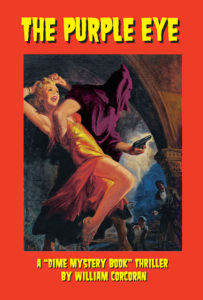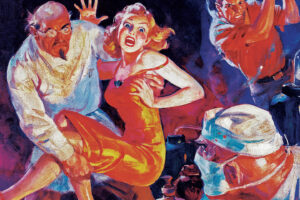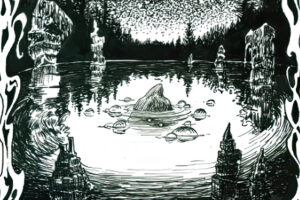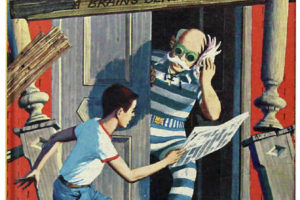 Most people are aware of Popular Publications’ Dime Mystery Magazine, the originator of the “weird menace” genre. But before it was Dime Mystery, it was Dime Mystery Book Magazine, with a different theme.
Most people are aware of Popular Publications’ Dime Mystery Magazine, the originator of the “weird menace” genre. But before it was Dime Mystery, it was Dime Mystery Book Magazine, with a different theme.
Created as a companion to Dime Detective, for almost a year it went with the gimmick of offering a true mystery/thriller novel in each issue. To emphasis this, the cover was done to look like a book cover and spine, with the book cover art being a bit squashed on the cover. Apparently, most of the novels weren’t all that great, and after 10 issues of this, the format changed, the magazine became Dime Mystery Magazine, and a little later the “weird menace” tales began.
But toward the end, they did put out one interesting mystery/thriller, and that was The Purple Eye by William Corcoran in August 1933 issue. This has been reprinted by Murania Press, the sixth (and I am thinking the last) in their “Classic Pulp Reprints” series, though there is nothing to mark this book as part of this series. Cover artwork from another pulp magazine was used for this reprint, which is fine because the original cover art by Walter Baumhofer, while pretty good, is constrained by the original layout. You can see it on the back of the volume.
Along with the novel, this volume also reprinted an article by Shawn Danowski that ran in the Purple Prose fanzine and discussed the Dime Mystery Book Magazine period in general and The Purple Eye in particular.
What is interesting about this novel is how in many ways it’s almost a proto-Spider novel. The hero of this work is rich adventurer Wayne Saxon, who returns to New York, which is being terrorized by a sinister cult. In addition to his girlfriend, Saxon is aided in his work by his manservant Christophe, who is Sengalese, and a mysterious woman who leads a group of men known as the Secret Hundred. Not only does Saxon need to worry about The Purple Eye‘s gang, the Brotherhood of Baktuun, but he has to contend with the police as well.
It is interesting that The Spider would appear a couple of months later from Popular. As it was the same publisher, could ideas from this novel have been picked up for The Spider?
This novel is an interesting read on its own, but when you think of the possible influences on other stories, it becomes a bit more important in some ways. If you haven’t, check this one out.



